|
|
|||
|
(Back to Preceding Week; on to Next Week) |
|
|
|
PERDITA'S HOME . . . AGAIN!
We're sure when Lenore and Jim Berry of Rock Hill SC retired from their teaching jobs they envisioned a life of leisure with no real responsibilities. Daughter Barbara moved across the state line to Charlotte NC to follow a career of her own, and the Berrys took in two Chihuahuas to help fill an empty nest. The dogs were responsibility enough, but in mid-October 2003 something happened that had a long-lasting effect on the lives of Jim and Lenore. It seems from all the hundreds of houses in Rock Hill with sugar water feeders, a female Rufous Hummingbird chose to spend its non-breeding season with the Berrys--far from her expected winter home in central Mexico.
All text, tables & photos © Hilton Pond Center PERDITA 2007
To recap, back in autumn 2003 Lenore contacted Hilton Pond Center to inform us a different-looking hummingbird was lingering, even though her summer assemblage of Ruby-throated Hummingbirds had already departed. She first saw the tardy bird on about 17 October 2003, although it might have arrived earlier and gone undetected among the ruby-throats. We asked Lenore to keep us posted about her hummer, which we suspected was NOT a ruby-throat; when it likewise became obvious the bird was not a short-term visitor we laid plans to take our portable trap to capture the hummingbird and determine its species. We finally rendezvoused at the Berry home on 5 December 2003, trapped the hummer, and verified Lenore was hosting a young female Rufous Hummingbird that had hatched out recently--sometime in the summer of 2003 and somewhere in western Canada or the northwestern U.S. Knowing Rufous Hummingbirds are more cold tolerant than ruby-throats, we encouraged Lenore to continue feeding her bird throughout the winter--which she did religiously, even when overnight temperatures dropped below freezing and necessitated she thaw out the feeder. We also accepted Lenore's gracious offering of homemade nutbread, of which we have grown quite fond.
After caring for Perdita all during the winter of 2003-2004, Lenore last saw her on 11 April 2004 and settled into a warm-weather retirement routine of gardening and keeping the feeders fresh for a new crop of Ruby-throated Hummingbirds. All during the summer of 2004 Lenore thought about Perdita, pondering her whereabouts and whether the wayward hummer might return to Rock Hill again that autumn. Sure enough, on 15 October 2004 we got word from Lenore that an apparent Rufous Hummingbird was at her feeders; the conscientious and hospitable Mrs. Berry invited us to visit her home again to verify that Perdita had returned AND so we could have more of that delicious nutbread. To shorten the story considerably, we trapped Lenore's visitor in November 2004--conforming it was indeed Perdita--and we went back in December 2005 and October 2006 with the same procedure and results: Set the trap, bait it with a hummingbird feeder, wait for a winter hummer to fly in, close the trap door, identify the hummer as Perdita, and sit back to celebrate with Lenore over a tasty breakfast of warm, toasted nutbread smothered in butter.
By the time Perdita had departed in late March 2007 Lenore had grown proud of hosting a winter vagrant from out west, and rightly so. After all, for four years Lenore faithfully freshened Perdita's feeder each winter from October through March--all for the sake of a single hummingbird. We applaud Lenore's dedication and somehow weren't surprised when we got the call a few weeks ago that Perdita--now a fifth-year bird--apparently was coming once more to Lenore's hummingbird feeder. We showed up before dawn at the Berry residence on 8 November 2007, hung the trap outside the usual second-story window and sat back in the dark to await Perdita's appearance. Similar to the preceding four years, she showed up just as the sky began to lighten, took one look at the feeder in the trap, and disappeared. About 20 minutes later she repeated the investigation but never entered the trap, finally coming back an hour later for a longer look. The hummer still wasn't all that interested in sugar water, perhaps because a mostly warm autumn meant there were plenty of tiny insects and even a few still-flowering plants to satisfy her breakfast needs. Lenore, a little impatient, was about to give up hope we would capture the rufous this fall and know without doubt it was Perdita. Suddenly, however, the hummingbird reappeared, entered the trap without hesitation, and was soon in hand.
All text, tables & photos © Hilton Pond Center Even at first glance there was no question Lenore's hummer was an adult female Rufous Hummingbird, Selasphorus rufus. The bird's plumage was intensely colored and was in pristine condition--quite unlike the drab, relatively unkempt appearance of a young bird. As we held the hummer we carefully turned her over and looked for the right leg; we were delighted to see it bore a tiny aluminum band. We took only a second to read the number--Y14855--assuring us that, yes indeed, Perdita had come once again to her winter home in Rock Hill SC, and on about the same day as usual (see Table 1 below).
One of the nice things about recapturing an already banded hummingbird is it doesn't take long to weigh it, measure its wing chord and culmen and tail lengths, check its plumage condition, and let it go. After quickly but accurately recording our observations, we carried Perdita out to the Berrys' front yard, snapped the requisite photos for this page, and handed the bird to Lenore, who--for the fifth year in a row--got to release Perdita back into the wild. We're glad the whole process went fast for the sake of the hummer . . . and because it meant we got to have some of Lenore's yummy toasted nutbread that much sooner.
Perdita's return in the fall of 2007 provides interesting information about similarities and changes over time. As shown by Table 2 (above), her measurements have been reasonably constant, although we were surprised this year to see her wing chord measure dropped a couple of millimeters. In most migrant hummingbirds, hatch year birds have longer wing feathers that are molted over the winter, with the replacement feathers measuring somewhat shorter. (The logic is that young birds benefit from slightly longer wings during their first migratory flight, and that experienced birds don't need the extra wing length.) A reduction in Perdita's wing chord from last year's 44.5mm to this year's 42.5mm doesn't seem like much, but it IS almost a 5% change. One other notable thing about Perdita in 2007: The two front-most primary feathers (9 and 10) (right wing below) are "old" and somewhat faded, while primaries 1-8 and the primary covert feathers overlapping their bases are all dark and unworn, indicating they were molted quite recently. In 2005, only primary #10 was old. Perdita undoubtedly will replace primaries 9-10 before she departs next spring for her annual migration back to the breeding grounds.
Perdita continues to add metallic throat feathers as she ages (see Table 2 and comparative photos at top of page), but will never get the full orange-red gorget of an adult male Rufous Hummingbird. Likewise, she will not acquire the male's rusty dorsum, although Perdita does now have lower back feathers edged with rufous. She's also acquiring more noticeable rusty coloration around her dark eyes.
To us, Perdita's tail very well may be her most attractive attribute. The central tail feathers (first rectrices) are broad and deep, iridescent green, and the adjoining ones are edged in rich rust along the lower half. The second rectrices are nippled at the tip--one sign of an adult female rufous whose juvenile tail feathers were more rounded. Because of our scientific goals, we try to be objective in our work, but it's hard not to gush about Perdita and her long-term fidelity to Lenore and Jim Berry's winter feeder. As always, we are amazed she can find the same neighborhood in Rock Hill SC, much less the very house that maintains a feeder in winter. Although Perdita is not the oldest Rufous Hummingbird on record, she is certainly one of the best documented vagrants; we also feel safe in saying she must be the matriarch for her species in South Carolina--a long way from where she "should" be spending the non-breeding months. Lenore's daughter dubbed the rufous visitor "Perdita" after a Shakespearean character whose own name came from the Latin word for "lost." One thing's for sure, however: When Perdita shows up in Rock Hill each autumn, she's not lost. She knows exactly where she is, and that's at her winter home with the Berrys. We can hardly wait to get our sixth annual phone call from Lenore in October 2008 saying not-at-all-lost Perdita is home once again. All text, tables & photos © Hilton Pond Center POSTSCRIPT: If you'd like to review the accounts of our previous encounters with Perdita, click on the links below. 2003: Rufous Hummingbird Banded At Rock Hill SC (5 Dec 2003)
Comments or questions about this week's installment?
Thanks to the following fine folks for recent gifts in support of Hilton Pond Center for Piedmont Natural History and/or Operation RubyThroat: The Hummingbird Project. Your tax-deductible contributions allow us to continue writing, photographing, and sharing "This Week at Hilton Pond." (Please see Support if you'd like to make a gift of your own.)
IMPORTANT NOTE: If you ever shop on-line, you may be interested in becoming a member of iGive, through which nearly 700 on-line stores from Barnes & Noble to Lands' End will donate a percentage of your purchase price in support of Hilton Pond Center and Operation RubyThroat. For every new member who signs up and makes an on-line purchase iGive will donate an ADDITIONAL $5 to the Center. Please sign up by going to the iGive Web site; as of this week, 197 members have signed up to help Hilton Pond Center. It's a painless, important way for YOU to support our work in conservation, education, and research. "This Week at Hilton Pond" is written & photographed You may wish to consult our Index of all nature topics covered since February 2000. You can also use our on-line Hilton Pond Search Engine at the bottom of this page. For a free, non-fattening, on-line subscription to |
|
Make direct donations on-line through
Network for Good: |
|
|
LIKE TO SHOP ON-LINE?
Donate a portion of your purchase price from 700+ top on-line stores via iGive: |
|
|
Use your PayPal account |
|
|
SPECIES BANDED THIS WEEK: * = New species for 2007 WEEKLY BANDING TOTAL 13 species 153 individuals YEARLY BANDING TOTAL (2007) 62 species 1,593 individuals 26-YEAR BANDING GRAND TOTAL (since 28 June 1982) 124 species 49,676 individuals NOTABLE RECAPTURES THIS WEEK (with original banding date, sex, and current age) Carolina Chickadee (1) American Goldfinch (8) Northern Cardinal (2) White-throated Sparrow (6) Carolina Wren (2) Downy Woodpecker (1) Tufted Titmouse (1) House Finch (1) American Robin (1)
|
OTHER NATURE NOTES OF INTEREST --With the arrival of Red-breasted Nuthatches last week, two Purple Finches on 8 Nov, and a Pine Siskin two days later, the Center can say it now has hosted three long-awaited migrants expected to journey south in the winter of 2007 due to Canadian seed crop failures. We don't want to set our hopes too high, but a flock of Evening Grosbeaks would be welcome as well. (While we're hoping, maybe we could even get a stray Common Redpoll or two.) --Like last week, among this week's highlights at Hilton Pond Center were a slew of returning banded birds, especially American Goldfinches from 2005 and White-throated Sparrows from the winter of 2006. Of special interest were an elderly Tufted Titmouse from 2003 and what we believe is our oldest ever House Finch--an after 6th year female banded the day after Christmas 2001. All text & photos © Hilton Pond Center
|
|
|
|
(Back to Preceding Week; on to Next Week) Up to Top of Page Back to This Week at Hilton Pond Center Current Weather Conditions at Hilton Pond Center |
 You can also post questions for The Piedmont Naturalist |
Join the |
Search Engine for |
|
|
Free Internet Providers

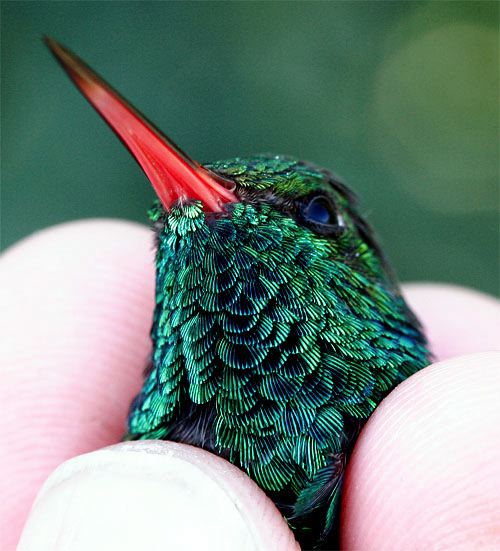 Week One AND Week Two of our annual
Week One AND Week Two of our annual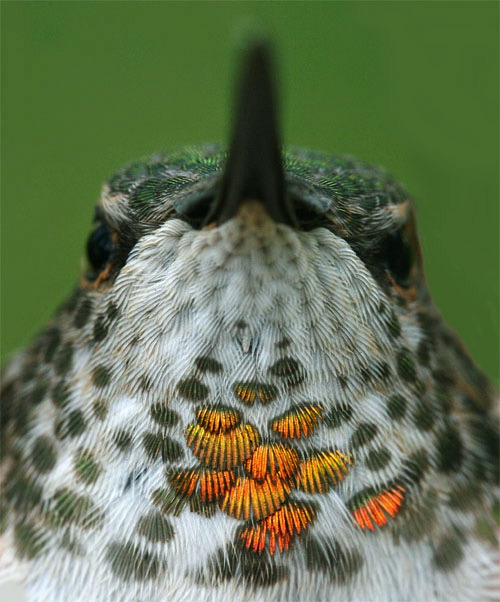
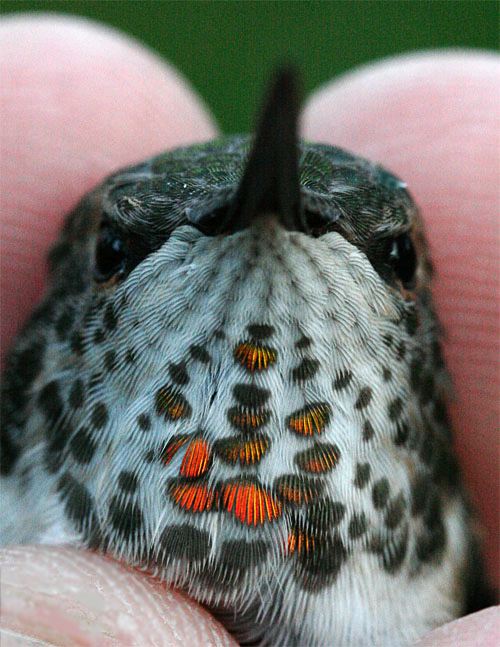
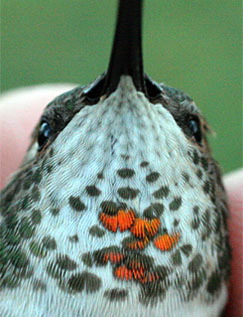
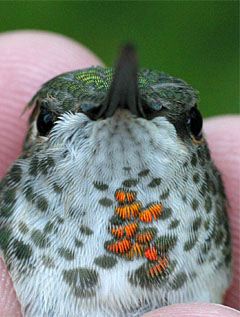
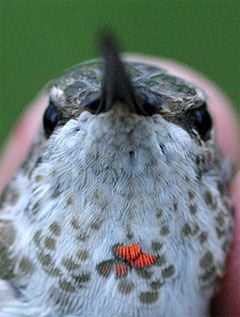
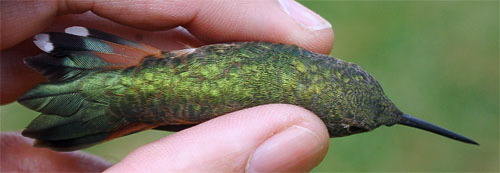


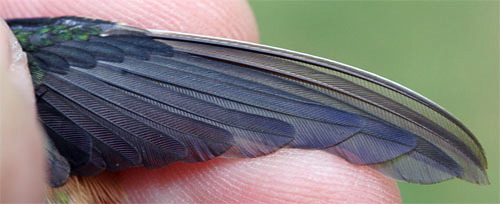
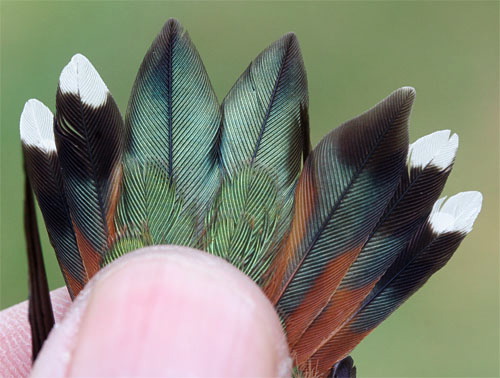
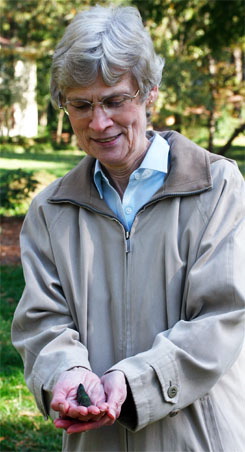 (NOTE: There are five pairs of rectrices. The outermost rectrix on the right of the photo above is hidden; its white tip is barely visible behind the white tip of rectrix #4.)
(NOTE: There are five pairs of rectrices. The outermost rectrix on the right of the photo above is hidden; its white tip is barely visible behind the white tip of rectrix #4.)

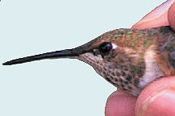 Oct 15 to Mar 15:
Oct 15 to Mar 15: